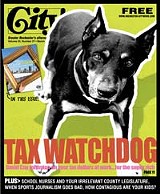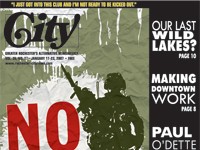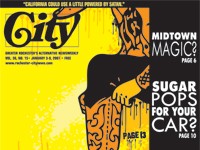[
{
"name": "500x250 Ad",
"insertPoint": "5",
"component": "15667920",
"parentWrapperClass": "",
"requiredCountToDisplay": "1"
}
]
Part one of a two-part series.
by Ron Netsky
You're having trouble making ends meet, so how come it seems like the rich are getting richer? It seems that way because it's true, far more than you ever imagined. David Cay Johnston's new book, Perfectly Legal: The Covert Campaign To Rig Our Tax System To Benefit the Super Rich --- And Cheat Everybody Else, leaves no doubt. When it comes to rising and falling incomes, tax shelters, and inept government officials, the bottom line is: You're getting screwed.
Johnston, who lives in Brighton with his wife Jennifer Leonard (executive director of the Rochester Area Community Foundation) and two of their daughters, has made a career of exposing wrong-doing. Among his awards is a Pulitzer Prize for his investigative reporting at the New York Times in 2001. Johnston is proud of his work and not shy about discussing his considerable journalistic accomplishments (see sidebar).
His ability to explain complex financial matters in plain English is one reason Perfectly Legal has been on the New York Times best-seller list for six weeks. The book is a devastating indictment of the United States tax system, revealing that some of the country's highest-income people get away with paying little or no taxes. Meanwhile, a besieged, under-equipped Internal Revenue Service goes after the little guy. The book should be required reading for the power elite in Washington, DC. It may already have some of the masters of the universe cowering.
In a recent wide-ranging interview at his Brighton home, Johnston discussed growing income disparities, off-shore corporations, the responsibilities of citizenship, and the propaganda that hides the truth about concentrations of wealth. Excerpts from that interview follow:
Johnston: The central idea [of Perfectly Legal]is that our national myth, that we heavily tax the highest income Americans for the benefit of those who make much less, is literally a myth. In fact, people making as little as $30,000 up to $500,000 are being heavily taxed to subsidize the super rich. And by that I mean people making at least $3 million a year consistently.
City: In your book are charts showing how the top one percent in the country nearly doubled its income in the last 30 years while the income of the bottom 90 percent went down a bit. And the exorbitant income growth of the top one-hundredth of one percent is shown on a bar-chart that would have to continue off the page for 62 feet. Rush Limbaugh would call this class warfare, but can anyone dispute your facts?
Johnston: We've had this enormous expansion of the economy. If you remember the late 1950s and early 1960s, because of falling prices Americans are relatively better off now than these numbers suggest, which is what people like Rush Limbaugh want to point out. That's true, but the income inequality wasn't there. When I was a boy in Santa Cruz in the early 1960s, I knew the wealthiest man in town. I dated the daughter of the man who owned the biggest industry. Those things don't happen today. We are becoming economically segregated the way we were racially segregated in our society.
People who have a lot of money are living in gated communities. We don't have them in Rochester, which is one of the reasons I love living here. But in Southern California they're all over the place. And they have private police patrols. Class warfare is an argument used by people who don't want to examine these issues and want to de-legitimize them. If somebody wants to label this class warfare, it's perfectly legitimate to ask whether those at the top may be waging class warfare on everybody else.
City: But a lot of people seem to be comfortable enough not to be politically motivated.
Johnston: That's exactly right, but I don't think they realize how badly they're being squeezed relative to the people above them. In 2000, the top 400 taxpayers earned 1.1 percent of all income in America. Back in 1970, to earn the top one percent took more than 25,000 people. What does that tell you about the concentration of income?
The top 400 taxpayers in 1993 paid 30 cents on the dollar in federal income tax. That's just not an oppressive burden when looked at that way. They wrote checks for $38 million --- that's a lot of money --- but as a percentage of their income: 30 percent. By 2000 they were down to 22 cents on the dollar. If the Bush tax cuts had been in effect, they would have paid 17 cents. That's an actual reduction in burden of 25 percent and a potential reduction under Bush of 41 percent. What happened to everybody else, from the poorest person in America up to just below $400,000? They went from paying 13 cents on the dollar to 15. Their taxes rose. Basically, the group that's being squeezed is the $50,000 to $500,000 group.
The group at the top's taxes fell because 70 percent of their income was from capital gains [money made from investments]. When we adopted the income tax, we taxed capital at a higher rate than earned income because most people earned their income by the sweat of their brow and [capital gains were] seen as immoral. Today most people don't earn their income by the sweat of their brow, but a large number still do. But we [now] tax capital at a lower rate. Maybe we have to do that because of the world economy and the rules we've made. Maybe we don't have to, but we're not debating that. In fact, it is the stated position of the Bush administration to eliminate taxes on capital.
City: You describe a "political donor class" that gets what it wants in terms of lax tax enforcement. Contributions are made to politicians who hamstring the IRS, allowing the contributors to avoid taxes.
Johnston: About one in 850 Americans makes significant [campaign] contributions. Within that group there are people who don't want to pay taxes. I don't want to leave the impression that all wealthy people are part of this. There are lots of wealthy people, and I thank some of them in this book, who are perfectly thoughtful. There is a narrow group that has vastly disproportionate power here who are funding all of this anti-tax rhetoric in this country because they don't want to pay taxes.
You're a voter --- when do you ever meet your politicians? Maybe you shake hands with them in the shopping mall. People who are important donors get to sit down and petition the government for the redress of their grievances, which they have an absolute right to do. They get to explain their concerns. There's a big segment of that group that is anti-tax, and they spend money hiring ideological marketing organizations --- the Heritage Foundation, for example --- to craft arguments that make it sound like what's good for the super rich is good for you. I actually had Heritage's top tax guy tell me that they are the most important advocate for the working poor in America.
City: So one example would be politicians perpetuating myths, like calling the estate tax the "death tax"?
Johnston: There is no death tax in America, but they've marketed that idea. After finishing the book, I got off a plane and shared a taxi with a former state senator who is personally very comfortable. He told me that I was being overly kind to politicians in my analysis. He said, "Every year that I was in office I knew who my 10 biggest donors were. I knew that I had to show them that I was working for what they wanted or they would just take their money and go to the other guy. And, you know, I don't think I ever once looked in the mirror and said, 'What am I doing for the average person in my district?'"
My best example of the political donor class is: Two days after 9/11 Congress came back into session. The Republican leadership had 10 bills they introduced to deal with the attack on 9/11. One of them was a tax bill. So what did it do for the firefighters, the police officers, the volunteers, the secretaries, the military officers sitting at their desks at the Pentagon and the flight attendants [who were killed]? It gave them estate tax relief. Not income tax relief, not a guaranteed college education for their kids --- estate tax relief. That's what Congress thought they needed. It was like a Rorschach test, and what did we find out? Congress was thinking about the super rich. Classic economic theory says that's what Congress should do under our campaign system, because those are their real patrons.
City: One of the great propaganda devices to sell the abolishment of the estate tax is the idea of losing the family farm.
Johnston: Right after Bush took office I called up the White House and said, "Hi, I'm the tax reporter at the New York Times, you're going to be dealing with me from time to time. How are you? And listen, the President says to save the family farm we have to kill the death tax, so I need to find some of these farmers who have lost their farms." "OK, we'll get back to you." They never did. I also called the American Farm Bureau Federation and a couple of State Farm Bureaus.
I go out to Iowa with a photographer. We spend a week running around the state. We interview 24 farmers in the wealthiest counties; that's where you're most likely to have the estate tax. These guys laughed. The chairman of the Marshall County Board of Supervisors slapped his thigh and said, "You city boys are dumb enough to swallow that stuff. This isn't about us; this is about the Mars Candy family."
I said, "Wait a minute, you guys are all Republicans, elected officials. This is your president, your party." They said, "But he's not doing this for us. We need higher farm prices. We need more for a bushel of corn and soybeans. This is for the super rich; they're just using us." The only farmers who pay estate taxes are super wealthy men like George Bush and Ted Turner.
After the story ran, President Bush flew to Iowa and gave a speech: "I've talked to families who lost the farm." I dialed the White House Press Office: "I need to run a corrective story; please put me in touch with those farmers." "We'll get back to you." They don't. I call again. To this day I've been unable to find such a farm. If there is a problem, it clearly is an extraordinarily small problem. A more honest campaign would be: We have to repeal the estate tax to save the family Picassos and Monets.
City: You were recently on "Lou Dobbs Tonight" (CNN) and Dobbs asked you what party you belonged to. You gave him an answer that audience members may have found surprising.
Johnston: He asked me about my party affiliation and I said, "It's a matter of public record; I'm a registered Republican." If he'd asked me how I voted I would have said, "With all due respect, none of your business."
When I was exposing the LAPD over beating people up, spying on people, the police chief assigning an officer to sleep with a woman so that she would give him political dirt on people; when I was hunting down a murderer the police failed to catch, or writing about how casino cops would go after a cocktail waitress who found a $500 chip on the floor, but looked the other way when a member of the Medellin drug cartel was extended millions of dollars of credit; and when Donald Trump improperly infused capital into his casino --- I was writing about law and order.
I have a very small tolerance in a democratic society for criminal behavior. I think people who are drug users need to be rehabilitated. But I think that for people who are committing crimes at all levels of society, we should have strict law enforcement. A lot of my book is about how we have very strict law enforcement in terms of taxes for the working poor, we have reasonable if somewhat excessive law enforcement for the middle class, but for the super rich, we have so little law enforcement that two billionaires I name have gone 30 years without filing a tax return and nothing has happened to them.
Why are these billionaires allowed to steal from you and me? You cannot have a democratic society and you cannot have justice if you do not have a serious, equal regime of law enforcement.
I have been called, by a professor at one of the big business schools, the de-facto chief tax enforcement officer of the United States. Before the current IRS Commissioner, Mark Everson, came in, his chief PR guy said to me, "You're going to like this guy because he's pretty much eye-to-eye with you on law enforcement." When I went to meet him for the first time, he said, "A lot of what we're going to do is because of your work."
There are people out there who blame me for this and there are people who give me credit. I'll take both. I got the United States government to turn around. The problem is it's a Potemkin village approach. This is the functional equivalent of pursuing the war in Iraq not with the 175,000 troops but with 12,000 troops. We wouldn't have had the same result. That's what we're doing about tax cheating, going after this enormous problem with a tiny squadron.
City: And the IRS does its calculations on an abacus. Their computer system is way out of date.
Johnston: They don't have the right technology; they don't have the legal support. There are IRS offices where the lawyers prop up the desks with law books because the legs are broken. They don't have training; they get clobbered in court, and, in many cases, they make bad choices. Because of limited resources, they do what everybody does with triage. "This guy's going to die no matter what we do; this guy's going to live no matter what we do; this guy's going to live if we intervene." In really serious triage, you focus on "this guy is going to live." And that's what they're doing: focusing on the easiest cases.
City: We have a national debt, a Social Security crisis. If we collected some of the billions that you show are owed over the last 30 years we could make a dent in some of that.
Johnston: One of the reasons why we haven't seriously gone after the underground economy is that it's pictured largely as people who cut lawns and clean houses and therefore, what are you going to get out of them in taxes? There's a second underground economy. It's huge! It's full of people who have millions of dollars. They're not reporting and they're not paying.
I know about a fellow who owns a large office building in the United States. I don't know where he is; the IRS agent who told me about him couldn't give me any identifying information. He owns a prominent office building in the city where he lives. It's titled to an off-shore entity. He has a mortgage on it so the interest payments on it become tax-deductible. He rents half of it to this entity, or his business, which means he's renting it to himself without paying taxes. He rents the other half to the general public and that money all goes off shore.
The investigation showed that on his second mistress he was spending $600,000 a year. They have the credit card records. Who knows what he spent on the first one; she was being financed with cash. He reports a five-figure income. The IRS hasn't gone after him. This is just appalling.
City: What can be done to hold the IRS accountable?
Johnston: In the 1920s, when only the highest-income people paid income taxes, they were on the public record. In the microfilm of the New York Times there are stories saying things like: "Chicago, April 14, Julius Rosenwald, founder of the Sears Roebuck chain, went to the local office of the Internal Revenue Bureau and turned over a check for $1,111,216 and fourteen cents to the manager."
Congress passed a law that they wouldn't make that public anymore. Up until the Nixon era, whether or not you filed your tax return was public record. The most efficient law enforcement tool for improving taxes would be a public registrar on the internet or a technique by which you can find out.
Next week: Johnston talks about tightening the reins on off-shore companies. He also discusses the way high-income people are using nine-figure insurance policies to avoid paying taxes, and why the IRS would rather go after the poor and the middle class while leaving the super rich alone.
Putting words into action
The son of a 100-percent disabled World War II veteran, Johnston grew up in Santa Cruz under difficult economic circumstances. His sister grew up to be a clerk in a county jail; his brother is a guard in an Indian Casino. One of his childhood friends has spent most of his life in prison.
Johnston began working at the age of 10, and by 13 had the equivalent of a full-time job: four newspaper routes in the morning and three in the afternoon, not to mention yard work and babysitting. By 15, he had his own business as a distributor for the San Jose Mercury. Married at 17, he had a child at 18 and five children by 23.
At 18 he impressed a Mercury reporter with his knowledge of local politics, but when he interviewed for a job there he was greeted with laughter. He persisted and, at the age of 19, was hired full time. When he left five years later, still the youngest reporter on the paper, he was able to buy his own house. (Johnston has six years of higher education, but no degrees. Too bored for required courses, he talked his way into upper division classes at state colleges and, later, the University of Chicago Graduate School of Economics.)
Johnston's next job was as investigative reporter for the Detroit Free Press, where he caused a television station to lose its license by proving that it was manipulating the news. "Business owners and politicians who didn't play ball with the owner were made to look bad," Johnston says. While in Detroit he also won a national environmental reporting award and, through his reporting, caused a change in some unsafe underground construction practices that had killed 64 men.
In the early 1980s he moved to the Los Angeles Times, where he took a close look at some of the practices of the Los Angeles Police Department. He was respected by some but vilified by Police Chief Daryl Gates because he examined the LAPD's violent side. "Back then the LAPD to most people was still Dragnet --- just the facts, ma'am --- the most honest, efficient, effective police department in the world."
Johnston says he pushed the LA Times further than editors wanted to go, earning himself a transfer to the features department. That didn't stop him from hunting down a murderer who had eluded the police and getting an innocent man released after five murder trials.
In the late 1980s, legendary editor Eugene Roberts hired Johnston at the Philadelphia Inquirer to cover the casino industry. "When the Supreme Court, in 1987, ruled that the Indians could have casinos, I said to the LA Times, 'This is going to be a major story. Corporate America is going to get into the gambling business, because the history of America is that if the red man has something, the white man will take it.'" He covered Atlantic City, where he discovered, in 1990, that Donald Trump was not a billionaire. "The lead was, 'You are probably worth more than Donald Trump.' He had a negative net worth of about $600 million."
When Roberts moved to the New York Times in the mid-1990s, he brought Johnston along. "Our plan was to open a running investigation of taxes and see what we find. The business editor thought it was just bizarre. He said they would arrange for me to move my family to Washington. I said, 'I'll never do what I want to do if I go to Washington. I'm going to cover them from my home in Rochester as much as you'll let me and from New York City.' The first year my desk was full of tax documents; I was sending myself to tax school. We all pay a lot of taxes, there are lots of stories about how to save $5, but nobody explains how the system really works. People said you can't penetrate the IRS; the secrecy is worse than the CIA."
Latest in Featured story
More by Ron Netsky
-

Album Review | 'Bizet: Carmen in Jazz'
Mar 26, 2024 -
'To Swing Is the Thing" by Mike Melito
Aug 10, 2023 - More »







